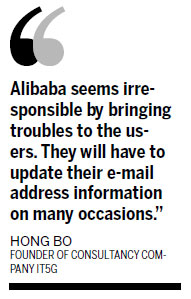No joy for Yahoo China as e-mail service to close
Updated: 2013-04-19 07:11
By Xie Yu in Shanghai (China Daily)
|
||||||||

Decision leaves company with only web portal business in local market
Yahoo China announced on Thursday it will shut down its e-mail service by Aug 19, another sign of the brand's shrinking presence in the Chinese market.
The company, part of Internet giant Yahoo, has been run by China's e-commerce leader Alibaba since 2005 after the two firms shook hands on a $1 billion deal that saw Yahoo given 40 percent of then little-known Alibaba's stock.
Closing Yahoo Mail, one of the earliest e-mail service providers in China, will leave the brand with only its web portal business in the China market.
Yahoo China told users on Thursday morning that they have to register a mailbox with AliCloud, a core business unit under Alibaba, to make sure their e-mails and other information will be kept instead of being deleted when Yahoo Mail ceases its operations.
"The decision was made mainly to support the users, as we are not sure how long we can provide the e-mail service under Yahoo's current technological structure," said Zhang Jianhua, from the public relations department of Alibaba.
Media reports said Alibaba is likely to "return" the Yahoo China unit to its US parent as early as May, but the company denied the message and said it will continue to operate Yahoo China for up to four more years.
"But we feel there are lots of uncertainties in terms of the brand's development, so we made the decision to help our users transfer to a more stable e-mail service provider," Zhang said.
Millions of users will have to make the change, he said, but the specific number is not yet available.
Zhang said the Yahoo Mail business sector is not profitable. The portal service is profitable, but seems very small when compared with other business units under Alibaba.
Analysts said Alibaba has been marginalizing Yahoo China's business by focusing on its lucrative e-commerce business Taobao, which dominates the domestic market, and the introduction of a cloud computing business under the AliCloud banner.
"I think Alibaba is giving up Yahoo China, while saving the resources of clients by transferring them to AliCloud," said Hong Bo, a Beijing IT expert and founder of consultancy company IT5G.
"But Alibaba seems irresponsible by bringing troubles to the users," Hong said. "They will have to update their e-mail address information on many occasions."
Alibaba's Zhang said the AliCloud mailbox will provide a stable service with a strong anti-spam function.
Data from Hitwise, a division of information services group Experian that measures website traffic, shows visits to Yahoo Mail have declined and the brand now has less than 2 percent of China's total mailbox users.
According to iResearch, there were more than 218 million e-mail users in China by the end of 2009.
Yahoo retains a 20 percent stake in Alibaba.
The latter has signaled that it is preparing to go public. Analysts said it could be valued at as much as $120 billion, almost five times more than Yahoo's mid-April market capitalization of $26.2 billion.
xieyu@chinadaily.com.cn
(China Daily 04/19/2013 page4)

 In Photos: 7.0-magnitude quake hits Sichuan
In Photos: 7.0-magnitude quake hits Sichuan
 Li Na on Time cover, makes influential 100 list
Li Na on Time cover, makes influential 100 list
 FBI releases photos of 2 Boston bombings suspects
FBI releases photos of 2 Boston bombings suspects
 World's wackiest hairstyles
World's wackiest hairstyles
 Sandstorms strike Northwest China
Sandstorms strike Northwest China
 Never-seen photos of Madonna on display
Never-seen photos of Madonna on display
 H7N9 outbreak linked to waterfowl migration
H7N9 outbreak linked to waterfowl migration
 Dozens feared dead in Texas plant blast
Dozens feared dead in Texas plant blast
Most Viewed
Editor's Picks

|

|

|

|

|

|
Today's Top News
Live report: 7.0-magnitude quake hits Sichuan, heavy casualties feared
Boston suspect cornered on boat
Cross-talk artist helps to spread the word
'Green' awareness levels drop in Beijing
Palace Museum spruces up
First couple on Time's list of most influential
H7N9 flu transmission studied
Trading channels 'need to broaden'
US Weekly

|

|







